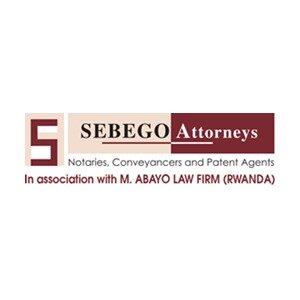Best Intellectual Property Lawyers in Botswana
Share your needs with us, get contacted by law firms.
Free. Takes 2 min.
Or refine your search by selecting a city:
List of the best lawyers in Botswana
About Intellectual Property Law in Botswana
Intellectual Property (IP) law in Botswana provides a framework for protecting the creative works and inventions of individuals and businesses. These laws cover a range of areas including trademarks, copyrights, patents, and industrial designs. The country aims to encourage innovation and creativity by providing legal mechanisms to safeguard the rights of creators and inventors, ultimately contributing to economic growth and development.
Why You May Need a Lawyer
Engaging an intellectual property lawyer can be crucial in various scenarios, such as:
- Registering a trademark, patent, or copyright to protect your intellectual assets.
- Handling disputes over IP rights, including infringement cases.
- Drafting and reviewing contracts related to licensing or transfer of IP rights.
- Guidance on compliance with local and international IP laws and treaties.
- Conducting due diligence in cases of mergers and acquisitions that involve intellectual property.
Local Laws Overview
Botswana's intellectual property laws are designed to align with international standards while addressing local needs. Key aspects include:
- Trademarks: Governed by the Industrial Property Act, allowing for the registration and protection of brand identifiers.
- Patents: Also covered under the Industrial Property Act, providing rights for inventions and technical innovations.
- Copyrights: Managed by the Copyright and Neighbouring Rights Act, offering protection for original works and performances.
- Industrial Designs: Protected under the Industrial Property Act, ensuring creators can secure exclusive use of visual design elements.
- International Treaties: Botswana is a member of several international agreements such as the Berne Convention and Paris Convention, providing additional layers of protection.
Frequently Asked Questions
What constitutes intellectual property?
Intellectual property refers to creations of the mind, such as inventions, literary and artistic works, designs, symbols, names, and images used in commerce.
How do I register a trademark in Botswana?
You must file an application with the Companies and Intellectual Property Authority (CIPA), providing detailed information about the trademark and its usage.
How long does patent protection last in Botswana?
A patent in Botswana is generally granted for 20 years from the filing date, subject to annual renewals.
What are the penalties for copyright infringement in Botswana?
Penalties include fines, imprisonment, or both, depending on the severity and nature of the infringement.
Can I protect my business design in Botswana?
Yes, by registering it under industrial designs with CIPA, you gain exclusive rights to use the design.
Is Botswana a signatory to the TRIPS Agreement?
Yes, Botswana is a signatory to the TRIPS Agreement, which sets minimum standards for IP protection internationally.
Can foreigners register IP in Botswana?
Yes, foreigners can apply for IP protection in Botswana, often requiring local representation or agents.
How long does trademark protection last?
Trademarks are protected for 10 years from the registration date and can be renewed indefinitely for successive ten-year periods.
Are trade secrets protected under Botswana law?
While not explicitly covered under the Intellectual Property statutes, trade secrets are protected under common law, mainly through contract and confidentiality agreements.
What is the role of CIPA?
The Companies and Intellectual Property Authority (CIPA) is the body responsible for registering and protecting IP rights in Botswana.
Additional Resources
For further assistance, consider the following resources:
- Companies and Intellectual Property Authority (CIPA): The main body for IP registration and protection in Botswana.
- Ministry of Investment, Trade and Industry: For broader policy-related information and frameworks.
- World Intellectual Property Organization (WIPO): For international IP concerns and treaties affecting Botswana.
- Botswana Intellectual Property Lawyers: Professional associations providing expert guidance.
Next Steps
If you need legal assistance with intellectual property matters:
- Consult with a local IP lawyer to understand your specific needs and rights.
- Gather all relevant information and documents that may be required for legal consultations or registrations.
- Contact CIPA for procedural guidance on applications, renewals, or disputes.
- Consider attending workshops or seminars on IP law to better understand your rights and obligations.
Lawzana helps you find the best lawyers and law firms in Botswana through a curated and pre-screened list of qualified legal professionals. Our platform offers rankings and detailed profiles of attorneys and law firms, allowing you to compare based on practice areas, including Intellectual Property, experience, and client feedback.
Each profile includes a description of the firm's areas of practice, client reviews, team members and partners, year of establishment, spoken languages, office locations, contact information, social media presence, and any published articles or resources. Most firms on our platform speak English and are experienced in both local and international legal matters.
Get a quote from top-rated law firms in Botswana — quickly, securely, and without unnecessary hassle.
Disclaimer:
The information provided on this page is for general informational purposes only and does not constitute legal advice. While we strive to ensure the accuracy and relevance of the content, legal information may change over time, and interpretations of the law can vary. You should always consult with a qualified legal professional for advice specific to your situation.
We disclaim all liability for actions taken or not taken based on the content of this page. If you believe any information is incorrect or outdated, please contact us, and we will review and update it where appropriate.
Browse intellectual property law firms by service in Botswana
Botswana Attorneys in related practice areas.
Browse intellectual property law firms by city in Botswana
Refine your search by selecting a city.












